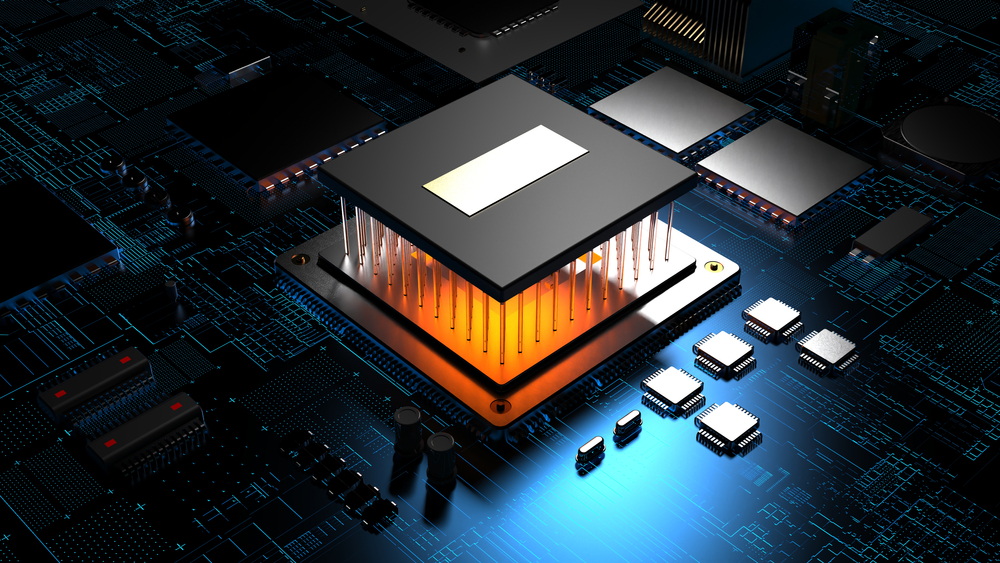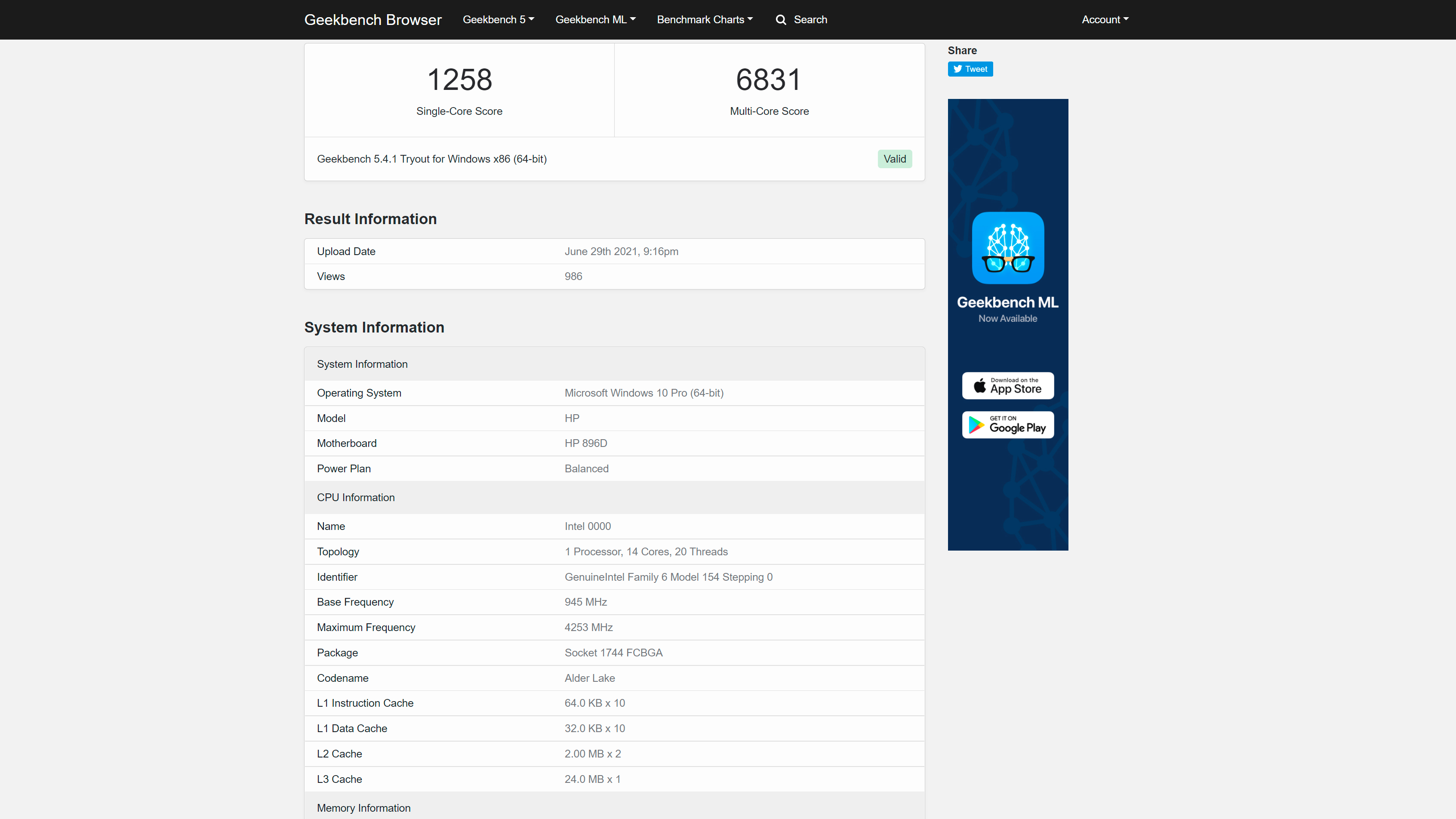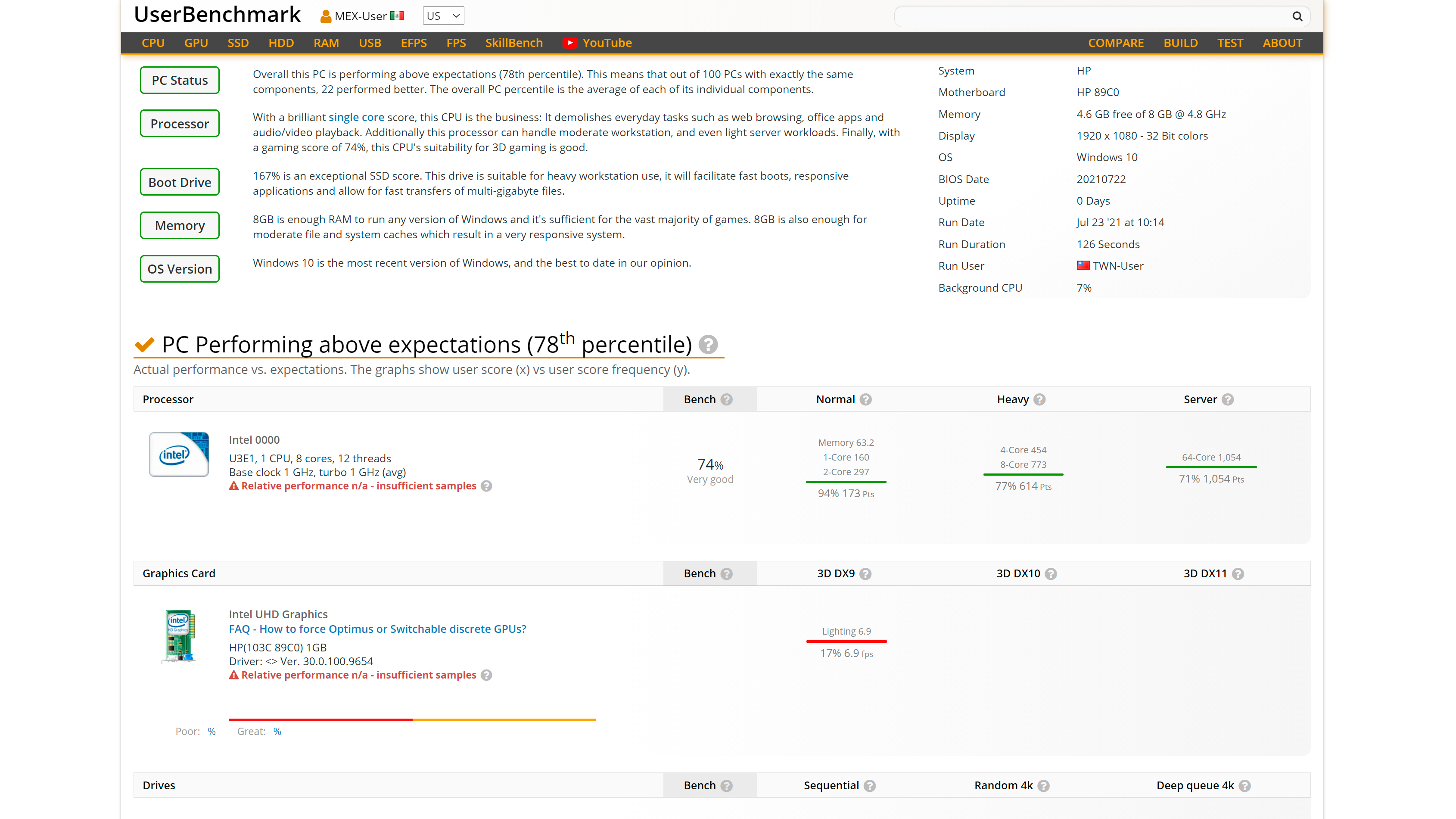Intel's 14-Core Alder Lake-P CPU Falls to 8-Core AMD Ryzen 7 5800H in Early Benchmarks

It looks like the AMD Ryzen 7 5800H doesn't have much to worry about yet. Based on early benchmarks spotted by hardware leaker Tum_Apisak, Intel's upcoming 12th Generation Alder Lake processors will have a strong rival in AMD's current mobile Ryzen 5000 (Cezanne) chips.
The benchmarks come from UserBenchmark and Geekbench 5. We recommend you take the results with a grain of salt as they haven't been confirmed by Intel. In addition, the users performed the tests on Windows 10 that probably affected Alder Lake's performance. Windows 11 is rumored to arrived with an improved scheduler to properly support Alder Lake.
The two Alder Lake chips in question emerged inside HP devices with DDR5 SO-DIMM memory, pointing to them belonging to the mobile Alder Lake-P lineup. The devices from the UserBenchmark and Geekbench 5 entries are labeled "HP 89C0" and "HP 896D." The first may be a test platform, while the latter likely corresponds to one of HP's EliteBook laptops.
A coreboot patch from last year exposed the potential configurations for Alder Lake-P processors. Thus far, we've seen up to six unique setups with different combinations of Golden Cove and Gracemont CPU cores. Unless Intel introduces more configurations on top of the already known, the entry-level Alder Lake-P part should start at two Golden Cove cores, with the flagship chip maxing out at 14 cores (six Golden Cove, eight Gracemont).
The Alder Lake-P chip from the Geekbenck 5 submission features 14 cores, 20 threads and 24MB of L3 cache. Since we suspect that only the Golden Cove cores have Hyper-Threading, this particular sample should sport six Golden Cove cores and eight Gracemont cores. Geekbench detected a 945 MHz base clock speed and 4,253 MHz boost but is likely misreporting the values, so we wouldn't pay much attention to those figures.
Paired with 16GB of DDR5-4800 SO-DIMM RAM, the 14-core Alder Lake-P processors put up single-and multi-core results of 1,258 points and 6,831 points, respectively.
For comparison, the average Geekbench 5 scores for the AMD Ryzen 7 5800H, which rocks eight Zen 3 cores with simultaneous multithreading (SMT), are 1,338 points in the single-core test and 7,063 points in the multi-core test.
Get Tom's Hardware's best news and in-depth reviews, straight to your inbox.
Based on these numbers, the Ryzen 7 5800H is up to 6% faster than the Alder Lake-P chip in single-threaded performance and 3% in multi-threaded performance.
The second Alder Lake-P, which comes from a UserBenchmark submission, is equipped with eight cores and 12 threads. There could be two possible configurations. We could be looking at two Golden Cove cores with eight accompanying Gracemont cores or an even split.
For the benchmark, the octa-core Alder Lake-P processor resided on a platform with one Hynix HMCG66MEBSA092N DDR5-4800 8GB SO-DIMM RAM modules. If you trust UserBenchmark, the Alder Lake-P system reportedly scored 160 points in the single-core benchmark and 773 points in the octa-core benchmark.
UserBenchmark has the Ryzen 7 5800H at 133 points and 898 points in the single-and octa-core benchmarks.
Based on these numbers, the Alder Lake-P sample offers up to 20% higher single-core performance, but the Ryzen 7 5800H outperforms the Intel chip by up to 16% in multi-core workloads.
Intel is expected to unleash Alder Lake in late 2021 or early 2022. Details are still scant, so it's unclear if the chipmaker will release the desktop version to compete with our Best CPUs list, start with the mobile version or release both simultaneously.

Zhiye Liu is a news editor, memory reviewer, and SSD tester at Tom’s Hardware. Although he loves everything that’s hardware, he has a soft spot for CPUs, GPUs, and RAM.
-
Giroro As far as I see it, it makes perfect sense that a 6 core processor is beaten by an 8 core processor.Reply
The tiny gracemont cores are mostly going to be a marketing gimmick to trick the "more cores is more better" market into thinking they're getting some mega-ultra ryzen-killer. But really, it's unreasonable to expect those extra Atom cores to provide much more than the compute power of a phone or netbook- assuming highly-parallel software can even use all the threads simultaneously. -
ceomrman2 ReplyGiroro said:As far as I see it, it makes perfect sense that a 6 core processor is beaten by an 8 core processor.
The tiny gracemont cores are mostly going to be a marketing gimmick to trick the "more cores is more better" market into thinking they're getting some mega-ultra ryzen-killer. But really, it's unreasonable to expect those extra Atom cores to provide much more than the compute power of a phone or netbook- assuming highly-parallel software can even use all the threads simultaneously.
That really remains to be seen if Windows and other devs can make good use of them. The little cores are supposedly as quick as low-power Skylake cores, so they ought to be able to handle important tasks. It's possible that most everyday tasks end up on the little cores until the user hits re-calculate on their spreadsheet. Little cores have become standard on mobile, after all, even on cheap chips. I also don't think the target market cares so much about core counts. Top-end Ryzens will be faster, so the hardcore will poo-poo Alder Lake regardless. These seem more geared to mainstream and business users who care more about battery life than top performance. Those systems often have lots of messy software on them - Office document synchs, anti-malware, authentication helpers, screenshot tools, IT management tools scanning and deploying and updating things under the hood, bloatware applying 3D surround effects to every beep and displaying the forecast on your taskbar, etc. Those seem like a waste of big core watts. -
spongiemaster Reply
You must have missed the 12900k benchmarks. 8 core beating 16 core. The leaked marketing slides from Intel indicated up to twice the multithreaded performance of an 11900k. And the below benchmarks indicate, this might actually end up being true:Giroro said:As far as I see it, it makes perfect sense that a 6 core processor is beaten by an 8 core processor.
The tiny gracemont cores are mostly going to be a marketing gimmick to trick the "more cores is more better" market into thinking they're getting some mega-ultra ryzen-killer. But really, it's unreasonable to expect those extra Atom cores to provide much more than the compute power of a phone or netbook- assuming highly-parallel software can even use all the threads simultaneously.
Intel Core i9-12900K benchmark leak puts the Alder Lake-S processor way beyond the capabilities of the AMD Ryzen 9 5950X while embarrassing the Core i9-11900K and Core i9-10900K -
ingtar33 Replyspongiemaster said:You must have missed the 12900k benchmarks. 8 core beating 16 core. The leaked marketing slides from Intel indicated up to twice the multithreaded performance of an 11900k. And the below benchmarks indicate, this might actually end up being true:
Intel Core i9-12900K benchmark leak puts the Alder Lake-S processor way beyond the capabilities of the AMD Ryzen 9 5950X while embarrassing the Core i9-11900K and Core i9-10900K
that's a desktop result, and apparently the alder lake desktop chip was running on a custom loop and heavily factory overclocked per the guy who posted the results. furthermore the article is about MOBILE chips not desktop, you posted desktop results.
-finally if this is all intel has under the hood, then alder lake will be DOA to the zen3+ release which will get a +15% ipc boost from the new cache. to say nothing for the ipc boost coming with zen4. it's a nice temp win for intel. and it will be a nice chip. but apparently per that same overclocker that intel chip was a 200TDP factory overclocked chip. -
Giroro Replyspongiemaster said:You must have missed the 12900k benchmarks. 8 core beating 16 core. The leaked marketing slides from Intel indicated up to twice the multithreaded performance of an 11900k. And the below benchmarks indicate, this might actually end up being true:
My starting thesis is that Intel's plan will be to essentially lie about core count, in order to trick the layman - similar to how they let their hardware partners count those optane cache drives as extra "memory" (RAM).. Even though the whole point of those things was to make storage run a bit faster ...
So I don't put any faith whatsoever into Inel's marketing.
Will a 10nm processor supporting DDR5 get better IPC than intel's 14nm? Definitely.
Will having a couple lower power cores to pick up background tasks improve battery life at Idle? Probably.
Do I care about the battery life in a desktop computer? Well... Somebody at Intel seems to think that matters.
Do I think Atom cores are going to meaningfully improve rendering performance? Well every Atom processor so far has had beyond terrible workstation performance.. So I'm highly doubtful of that.
Will games even ever see a benefit?
Not many games get any benefit from having over 16 threads, and odd are the extra complexity is going to cause frame-time issues, possibly to the point that either the game or the user will need to disable the low power cores, at least until software catches up.
If software actually ever does catch up... It doesn't exactly seem like Microsoft has their best and brightest engineers working on modernizing Windows as a functional OS. They're too focused on form-over-function.
I'm predicting Alder Lake will be a disaster in basically everything but ultrabooks or low end chromebooks - where the big.little concept actually makes sense. I think this next generation is the result of a cascade of management mistakes, miscommunication, and cost-cutting made during Intel's transition to a new CEO. I don't see this concept making it into an eventual 13900K. Trying to force a mobile architecture into the high performance market is just a bad idea, on the face of it. Bad enough that there's still a very real possibility Alder Lake-S will just be a paper launch.
But then again, Alder lake will probably still sell fine. Intel knows your mom doesn't know what a core or a benchmark is, she just sees a higher number and trusts that it will be better at the emails. -
ezst036 I think benchmarking against AMD is a fail of the worst kind.Reply
It seems painfully obvious that Alder Lake was designed to compete with ARM. So the benchmarks would be battery life against ARM battery life and other areas where ARM is known to excel. -
spongiemaster Reply
There's no such thing as a factory OC'd qualification sample CPU. Regardless, source of the benchmarks:ingtar33 said:that's a desktop result, and apparently the alder lake desktop chip was running on a custom loop and heavily factory overclocked per the guy who posted the results.
"12900KS QS Non-OC "
1417527787695448069View: https://twitter.com/OneRaichu/status/1417527787695448069
Not even going to bother with the rest of your post. -
spongiemaster ReplyGiroro said:My starting thesis is that Intel's plan will be to essentially lie about core count, in order to trick the layman - similar to how they let their hardware partners count those optane cache drives as extra "memory" (RAM).. Even though the whole point of those things was to make storage run a bit faster ...
So I don't put any faith whatsoever into Inel's marketing.
I don't put much faith in anyone's marketing. Raichu is a reputable leaker, so it is unlikely the results he posted are just made up. Something generated the benchmark results above, which come quite close to what Intel was claiming behind closed doors. It's not the marketing that should create interest, it's the benchmarks that seem to back it up.
Will games even ever see a benefit?
Not many games get any benefit from having over 16 threads, and odd are the extra complexity is going to cause frame-time issues, possibly to the point that either the game or the user will need to disable the low power cores, at least until software catches up.
I wouldn't pay too much attention to the multi-threaded results. For most people, they won't ever see the benefits of that because they don't need 24 threads almost ever. Look at the single threaded. 810 is a crazy result. That's 52% higher than a 10900k and 26% higher than a 5950x. 8 cores with 26% higher IPC than a 5950x should do ok in gaming, I think. It's really hard to see a scenario where that level of performance is going to be a disaster. -
TerryLaze Reply
So you think that intel added more cores, that draw more power, because they thought that that would decrease power draw?Giroro said:Will having a couple lower power cores to pick up background tasks improve battery life at Idle? Probably.
Do I care about the battery life in a desktop computer? Well... Somebody at Intel seems to think that matters.
You know very well that 100% every single review will unlock power limits and run avx 512 on all available cores at once and we will get headlines of "OMG intel at 400W" just like we did last time (just with even more watts) .
Adding terrible performance is still adding performance, AMDs 16 core CPU loses 25% on all cores when all cores are running. If alder can keep the bigger cores at full clocks, or close to, then there is so much less the smaller cores will have to do.Giroro said:Do I think Atom cores are going to meaningfully improve rendering performance? Well every Atom processor so far has had beyond terrible workstation performance.. So I'm highly doubtful of that.
The dissection will have to show which one will get better results.
From having all the background tasks completely isolated on the smaller cores away from the game threads? You bet your behind they will.Giroro said:Will games even ever see a benefit?
Not many games get any benefit from having over 16 threads, and odd are the extra complexity is going to cause frame-time issues, possibly to the point that either the game or the user will need to disable the low power cores, at least until software catches up.
Software for multiple CPUs on the same system is plenty mature and intel is one of the few that can actually implement it into windows.
All that said I still think that adding smaller cores is crap and only a hand full of people will actually benefit from it, I hope intel will release a full line up of CPUs without the smaller cores.

